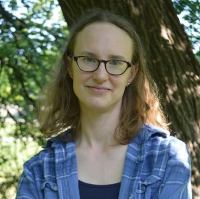Three Poems of the Last Generation
The left columns of the cleave poems in this series are in the voices of crew members aboard a generation ship. While they can be read as works of science fiction, the poems are a means for me to examine family relationships, especially in light of issues such as social justice and environmental concerns. To create the right columns, I used various sources contemporary to the poems’ writing as well as what I consider to be the speakers’ inner monologues. The resulting three-in-one poems give voice to the characters aboard the generation ship, to the social forces they contend with, and to the ways in which both complicate each other.
Last Generation:
The Engineer Composes a Message Before Departing for the Planet
(after Alex Sharp's I Rise)
|
Everything begins |
because of the difficulties of classification |
Lines in the right column in italics are from the World Health Organization's "History of the development of the ICD [International Classification of Diseases]" and those in bold are from Alex Sharp's I Rise.
Last Generation:
The Counselor Records an Increase in Instances of the Pathetic Fallacy as the Landing Party Prepares to Leave the Ship
"That is, it appears that individuals who view nature in anthropomorphic terms are more likely to feel guilty for environmental degradation, and they take more steps toward environmental action."
--Kim-Pong Tam, "Anthropomorphism of Nature, Environmental Guilt, and Pro-Environmental Behavior" (Sustainability, 30 September 2019)
|
this planet, which waits for us, accepts |
"a growing population: |
Phrases in the right column are from the "Summary for Policymakers" section of the International Panel on Climate Change's 2019 "Climate Change and Land" report.
The source of the epigraph can be accessed at the MDPI Open Access Journals site.
Last Generation:
The Communications Officer Imagines the Debate Over Naming the Landing Site After Houston as a Final Session of Couples Therapy
"Houston saw Texas as his 'land of promise.' For him, it represented a place for bold enterprise, rife with political and financial opportunity."
--Thomas H. Kreneck, from the "Sam Houston" entry on the Texas State Historical Association's website
|
We compromised: I let you |
after you married your third wife |

T.D. Walker is the author of Small Waiting Objects (CW Books, 2019), a collection of near-future science fiction poems. Her poems and stories have appeared in Strange Horizons, Web Conjunctions, The Cascadia Subduction Zone, Luna Station Quarterly, and elsewhere, and she curates and hostsShort Waves / Short Poems. She draws on both her grounding in literary studies and her experience as a computer programmer in writing poetry and fiction. Find out more at www.TDWalker.net. T.D. recommends the Prometheus Radio Project.


